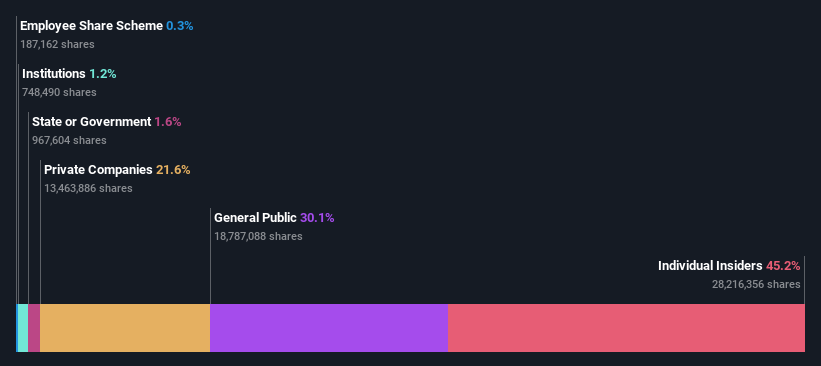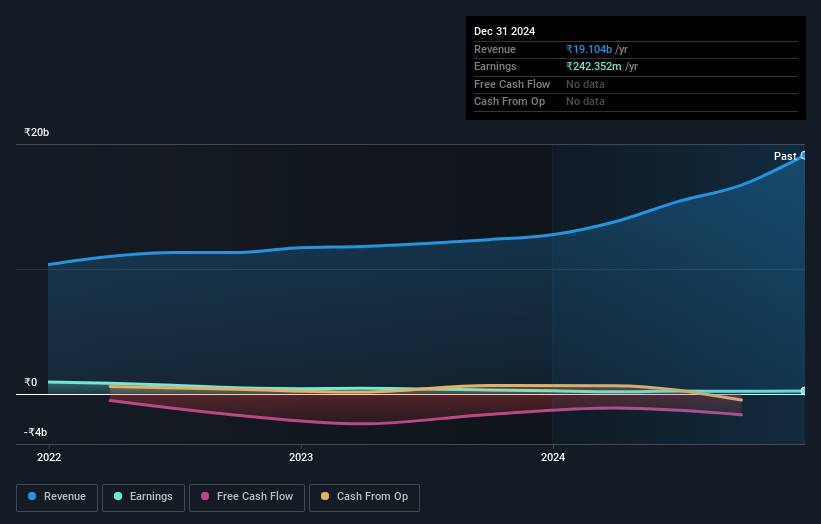Gulshan Polyols Limited's (NSE:GULPOLY) most bullish insider is Top Key Executive Chandra Jain, and their holdings value went up by 13% last week
Key Insights
- Gulshan Polyols' significant insider ownership suggests inherent interests in company's expansion
- A total of 3 investors have a majority stake in the company with 51% ownership
- Using data from company's past performance alongside ownership research, one can better assess the future performance of a company
Every investor in Gulshan Polyols Limited (NSE:GULPOLY) should be aware of the most powerful shareholder groups. We can see that individual insiders own the lion's share in the company with 45% ownership. That is, the group stands to benefit the most if the stock rises (or lose the most if there is a downturn).
As a result, insiders were the biggest beneficiaries of last week’s 13% gain.
In the chart below, we zoom in on the different ownership groups of Gulshan Polyols.
See our latest analysis for Gulshan Polyols

What Does The Institutional Ownership Tell Us About Gulshan Polyols?
Institutional investors commonly compare their own returns to the returns of a commonly followed index. So they generally do consider buying larger companies that are included in the relevant benchmark index.
Less than 5% of Gulshan Polyols is held by institutional investors. This suggests that some funds have the company in their sights, but many have not yet bought shares in it. If the company is growing earnings, that may indicate that it is just beginning to catch the attention of these deep-pocketed investors. We sometimes see a rising share price when a few big institutions want to buy a certain stock at the same time. The history of earnings and revenue, which you can see below, could be helpful in considering if more institutional investors will want the stock. Of course, there are plenty of other factors to consider, too.

Gulshan Polyols is not owned by hedge funds. From our data, we infer that the largest shareholder is Chandra Jain (who also holds the title of Top Key Executive) with 26% of shares outstanding. Its usually considered a good sign when insiders own a significant number of shares in the company, and in this case, we're glad to see a company insider play the role of a key stakeholder. For context, the second largest shareholder holds about 13% of the shares outstanding, followed by an ownership of 11% by the third-largest shareholder. Interestingly, the second-largest shareholder, Arushi Jain is also Senior Key Executive, again, pointing towards strong insider ownership amongst the company's top shareholders.
A more detailed study of the shareholder registry showed us that 3 of the top shareholders have a considerable amount of ownership in the company, via their 51% stake.
While it makes sense to study institutional ownership data for a company, it also makes sense to study analyst sentiments to know which way the wind is blowing. We're not picking up on any analyst coverage of the stock at the moment, so the company is unlikely to be widely held.
Insider Ownership Of Gulshan Polyols
The definition of company insiders can be subjective and does vary between jurisdictions. Our data reflects individual insiders, capturing board members at the very least. Company management run the business, but the CEO will answer to the board, even if he or she is a member of it.
Most consider insider ownership a positive because it can indicate the board is well aligned with other shareholders. However, on some occasions too much power is concentrated within this group.
It seems insiders own a significant proportion of Gulshan Polyols Limited. It has a market capitalization of just ₹13b, and insiders have ₹5.9b worth of shares in their own names. This may suggest that the founders still own a lot of shares. You can click here to see if they have been buying or selling.
General Public Ownership
The general public, who are usually individual investors, hold a 30% stake in Gulshan Polyols. While this group can't necessarily call the shots, it can certainly have a real influence on how the company is run.
Private Company Ownership
It seems that Private Companies own 22%, of the Gulshan Polyols stock. It might be worth looking deeper into this. If related parties, such as insiders, have an interest in one of these private companies, that should be disclosed in the annual report. Private companies may also have a strategic interest in the company.
Next Steps:
I find it very interesting to look at who exactly owns a company. But to truly gain insight, we need to consider other information, too. Consider for instance, the ever-present spectre of investment risk. We've identified 5 warning signs with Gulshan Polyols (at least 3 which are concerning) , and understanding them should be part of your investment process.
Of course, you might find a fantastic investment by looking elsewhere. So take a peek at this free list of interesting companies.
NB: Figures in this article are calculated using data from the last twelve months, which refer to the 12-month period ending on the last date of the month the financial statement is dated. This may not be consistent with full year annual report figures.
New: Manage All Your Stock Portfolios in One Place
We've created the ultimate portfolio companion for stock investors, and it's free.
• Connect an unlimited number of Portfolios and see your total in one currency
• Be alerted to new Warning Signs or Risks via email or mobile
• Track the Fair Value of your stocks
Have feedback on this article? Concerned about the content? Get in touch with us directly. Alternatively, email editorial-team (at) simplywallst.com.
This article by Simply Wall St is general in nature. We provide commentary based on historical data and analyst forecasts only using an unbiased methodology and our articles are not intended to be financial advice. It does not constitute a recommendation to buy or sell any stock, and does not take account of your objectives, or your financial situation. We aim to bring you long-term focused analysis driven by fundamental data. Note that our analysis may not factor in the latest price-sensitive company announcements or qualitative material. Simply Wall St has no position in any stocks mentioned.
About NSEI:GULPOLY
Gulshan Polyols
Engages in the mineral and grain processing, and ethanol distillery businesses in India and internationally.
Proven track record with imperfect balance sheet.
Similar Companies
Market Insights
Community Narratives




